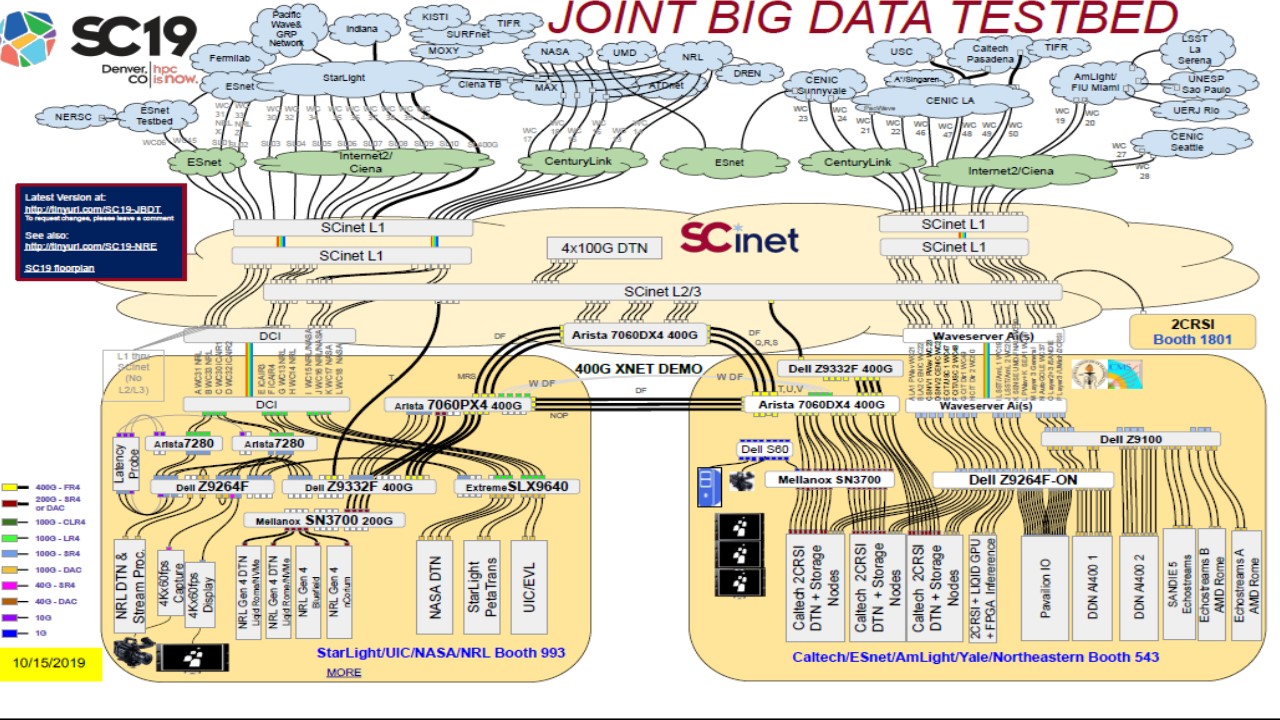The Metropolitan Research and Education Network (MREN) was established specifically to meet the requirements of data-intensive science. Increasingly, science research requires gathering, analyzing, and transporting extremely large volumes of data. Frequently, this transport requires support for high-capacity single end-to-end data flows (e.g. 10-100 Gbps individual flows). With its science community and network research partners, MREN is developing and implementing new techniques to provide such services.
These techniques include methods based on Software Defined Networking (SDN), Software Defined Exchanges (SDXs), Data Transfer Nodes (DTNs), Network Services Interface (NSI), the P4 programming language, and dynamic L2 and L1 provisioning. MREN currently also faces issues related to multi-100 Gbps, 400 Gbps and Tbps paths, including using bonded lightpaths provisioned over superchannels.
To showcase these innovative services and technologies, MREN collaborates with its community partners to stage demonstrations at major international and national technology workshops, conferences, and special forums. One major venue for these demonstrations is the Supercomputing Conference (SC). In 2019, the 31st annual ACM international Supercomputing Conference for High-Performing Computing, Networking, Storage, and Analysis International Conference (SC19) took place in Denver, Colo.For this conference, MREN, the SCinet Wide Area Network (WAN) team, the StarLight consortium, and multiple national and international research partners, designed and successfully staged over 30 large scale demonstrations. With SCinet, MREN, the StarLight consortium and other partners creating 11*100 Gbps network paths and one 400 Gbps path from the StarLight Facility in Chicago to the conference venue in Denver, 6*100 Gbps path from Washington, D.C. to the venue, and also 2*100 Gbps from Washington, D.C., to the StarLight Facility.
SC19 demonstrations included a showcase of capabilities for supporting Petascale science with the StarLight International Software-Defined Exchange (SDX); programmable WAN networking with the NSF Global Environment for Network Innovations SDX; the Global Research Platform; advanced services for the High Energy Physics, with a focus on the Large Hadron Collider Open Network Environment; astrophysics; geophysics; and dynamic systems provisioning.
MREN also participated in an extensive collaboration led by Argonne that won the Inaugural SCinet Technology Challenge at SC19 by demonstrating real-time analysis of light source data from Argonne National Laboratories Advanced Photon Source to its ALCF supercomputer. Accelerator-based light sources, which are large-scale instruments used to investigate the fundamental properties of matter, generate large amounts of data that require computational analysis. This demonstration showcased capabilities for real-time streaming and analysis at 100 Gbps.
Earlier in 2019, MREN supported international meshed DTN demonstrations as part of a global data mover challenge competition at the Supercomputing Asia Conference, which resulted in an innovation award presented to the StarLight consortium and the International Center for Advanced Internet Research (iCAIR) at Northwestern University.

